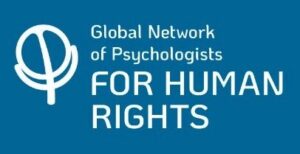Note from the Editors: The website of the Global Network of Psychologists for Human Rights (GNPHR) contains articles, events and news about the domain where psychology and human rights intersect. The information presented in this Bulletin is gathered from many sources and reflects many opinions. The publication of information does not imply that the GNPHR as a network, the GNPHR Steering Committee as a committee, or the individual subscribers share the views and beliefs expressed. The goal of the many opinions expressed is to stimulate reflection, discussion, and informed dialogue.

Table of Contents
SPECIAL COMMEMORATIVE DAYS – UN
- October 10, World Mental Health Day, https://www.who.int/campaigns/world-mental-health-day
- October 17, International Day for the Elimination of Poverty, https://www.un.org/en/observances/day-for-eradicating-poverty
- October 24-30, Disarmament Week, https://www.un.org/en/observances/disarmament-week
- November 16, International Day for Tolerance, https://www.unesco.org/en/days/tolerance
- November 18, World day for the Prevention of and Healing from Child Sexual Exploitation, https://www.un.org/en/observances/child-sexual-exploitation-prevention-and-healing-day
- November 20, Universal Children’s Day, https://www.un.org/en/observances/world-childrens-day
- November 25, World Day for the Elimination of Violence Against Women, https://www.un.org/en/observances/ending-violence-against-women-day
- November 29, Solidarity Day, International Day of Solidarity with the Palestinian People. https://www.un.org/en/observances/International-day-of-solidarity-with-the-palestinian-people
- November 30, Day of Remembrance for All Victims of Chemical Warfare, https://www.un.org/en/observances/chemical-warfare-victims-day
GNPHR NEWS AND EVENTS
Webinar Series Human Rights Education
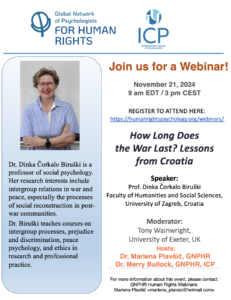 How long does the war last? Lessons from Croatia
How long does the war last? Lessons from Croatia
Speaker: Prof. Dinka Čorkalo Biruški,
November 21, 9 am EDT, 3 pm CET.
Register here
For recordings of all Webinars, see: https://humanrightspsychology.org/webinars/
New Section on the GNPHR Website and Content area in the Bulletin:
Voices against War
The GNPHR website has a new section, Voices Against War, where we publish communiques from academics and psychology organizations about war and its effects.
We also have initiated a new content area in the Bulletin. In this area, we feature voices that are concerned about War in their own way, including human rights violations and the loss of fundamental dignity and equality. We will also include articles where people speak out about the psychological drivers of militarisation and the military mindset.
Under the Middle East and Ukraine sub-headings of this content area, you will find articles relevant to the dialogue.
CONTENT AREAS AND NEWS
General
Reports
Scholars at Risk Summary Report on the 2024 Global Congress held June 25-27, 2024, in partnership with the European Humanities University (EHU) in Vilnius, Lithuania.
This summary report shares key insights from the four day event, including the workshops, panels, plenary sessions, and our Courage to Think Dinner and Award presentation. With over 250 in-person attendees from more than 60 countries, the 2024 Global Congress gave all of us the space to confront threats to scholars and academic freedom, to learn from each other’s experiences, and to help shape SAR’s agenda for the coming years. We invite you to explore the report and learn more about the Congress and our work.
Network of Concerned Historians, Annual Report 2024
This thirtieth Annual Report of the Network of Concerned Historians (NCH) contains news about the domain where history and human rights intersect, in particular about the censorship of history and the persecution of historians, archivists, and archaeologists around the globe, as reported by various human rights organizations and other sources. It mainly covers events and developments of 2023 and 2024.
2023 CESCR Yearbook – The Work of the Committee on Economic, Social & Cultural Rights
The 2023 Yearbook of the Committee on Economic, Social and Cultural Rights (CESCR) captures the full scope of the Committee’s activities over the year. The Yearbook enhances the visibility and accessibility of the Committee’s work and has quickly evolved into an essential resource for civil society, human rights practitioners, academics, States, and anyone interested in harnessing human rights to address poverty, social injustice and inequality. The sixth edition of the CESCR Yearbook offers a comprehensive and up-to-date overview of the Committee’s work in 2023.
This year, the Committee tackled a range of challenges to the enjoyment of rights, including armed conflicts, deforestation and climate change, while also advancing discussions on sustainable development. The Yearbook details how the Committee approached these issues through its various mechanisms: Concluding Observations following State reviews, General Comments, and decisions on individual communications.
International Coalition for the Responsibility to Protect
The International Coalition for the Responsibility to Protect (ICR2P) is a community of commitment made up of civil society and non-governmental organizations from around the world who are dedicated to the promotion of human rights, the prevention of atrocities and the effective and consistent implementation of the Responsibility to Protect (R2P) principle.
Founded in 2009 by eight organizations, the Coalition now includes members representing all regions of the world. Working with local human rights defenders, global advocates and campaigners for international justice, the Coalition’s membership works to enhance our collective capacity to prevent and halt genocide, war crimes, crimes against humanity and ethnic cleansing. (1)Community built on shared principles, (2)Diversity fuelling strength and purpose; (3) Solidarity resulting in real action
Opinion Pieces / Articles for Discussion
Drop Bothsideism, calling out populism and deliberate lies for the survival of democracy. Verfassungsblog, Marlene Wind, professor of political science and law at the University of Copenhagen and Special Advisor to the EU’s Foreign Policy chief Josep Borrell. Her most recent book is ‘The Tribalization of Europe – a defense of our liberal values, Polity Press, 11 October 2024.
Western media are not equipped to handle right-wing populists like Donald Trump, Orbán, or the AfD. Moreover, constitutional theorists who argue that democracy should be purely procedural are joining the populist chorus. ….
According to Webster’s dictionary, “bothsideism” means that the mainstream media and commentators, in a misguided attempt to balance opinions, give credence to views, positions, or actions that undermine the very same democracy that makes the expression of the viewpoint possible in the first place.
Is It Fascism? A Leading Historian Changes His Mind. Elisabeth Zerofsky, NY Times, Oct. 23, 2024.
Robert Paxton thought the label was overused. But now he’s alarmed by what he sees in global politics.
Paxton, who is 92, is one of the foremost American experts on fascism and perhaps the greatest living American scholar of mid-20th-century European history. His 1972 book, “Vichy France: Old Guard and New Order, 1940-1944,” traced the internal political forces that led the French to collaborate with their Nazi occupiers and compelled France to reckon fully with its wartime past.
In a column for a French newspaper, republished in early 2017 in Harper’s Magazine, Paxton urged restraint. “We should hesitate before applying this most toxic of labels,” he warned. Paxton acknowledged that Trump’s “scowl” and his “jutting jaw” recalled “Mussolini’s absurd theatrics,” and that Trump was fond of blaming “foreigners and despised minorities” for ‘‘national decline.’’ These, Paxton wrote, were all staples of fascism. But the word was used with such abandon — “everyone you don’t like is a fascist,” he said — that it had lost its power to illuminate. Despite the superficial resemblances, there were too many dissimilarities. The first fascists, he wrote, “promised to overcome national weakness and decline by strengthening the state, subordinating the interests of individuals to those of the community.” Trump and his cronies wanted, by contrast, to “subordinate community interests to individual interests — at least those of wealthy individuals.”
Fantasy-Impotence-Fascism. The Trump-Vance Political Theory. Timothy Snyder, September 22, 2024.
Though alien to most Americans, the worldview is important to understand, because it forecasts how America would be ruled should these men come to power. It has three elements: fantasy, impotence, and fascism.
A fantasy of evil done by others is deliberately invoked to create a sense of us and them. Government exercises power by taking revenge on groups, for example by deporting them (the first large-scale action of Hitler’s SS, by the way, was deporting immigrants).
International humanitarian careers. Blending Western psychology with local knowledge, mental health professionals are driving positive change around the world. Zara Abrams, APA Monitor, Vol. 55 No. 6, September 1, 2024.
Psychologists are increasingly leveraging their skills to aid international humanitarian and development efforts in partnership with nongovernmental organizations (NGOs) and other institutions. Expertise in crisis intervention, cultural competency, research methods, and clinical practice gives psychologists a unique perspective on how to help millions affected by war, poverty, and disaster. In these roles, they are aiding victims of circumstances, as opposed to psychologists working on human rights, who seek to protect and promote human rights through psychological research and practice.
In years past, well-intended providers arrived quickly on the scene after emergencies, such as the 2004 Indian Ocean tsunami, with Western interventions that may have unfortunately done more harm than good. But today, that approach has largely changed, said psychologist Amy Nitza, PhD, executive director of the Institute for Disaster Mental Health at the State University of New York at New Paltz. Instead, psychologists who want to help are focusing more on training local providers and building capacity for mental health services, she said, “with the ultimate goal of working ourselves out of a job.”
“How can Western psychology add value for the people who are already on the ground and doing this work from an Indigenous perspective?” Nitza said.
Those working in the field share guidance on how to shape a career around humanitarian aid, including skill building, finding job opportunities, and getting support for professional challenges.
Doing no harm
A principle central to humanitarian work: Do no harm. But would-be helpers can inflict great harm if they fail to recognize, affirm, and show appreciation for local cultures, said Michael Wessells, PhD, an emeritus professor of clinical, population, and family health at Columbia University who has provided psychosocial support to children and families in more than 30 war zones throughout his career.
Academic Freedom / Higher Education
Navigating Darkness. Anja Bossow, Eva Maria Bredler & Maxim Bönneman. Verfassungsblog, 12 October 2024.
Academic freedom is a fundamental value that promotes freedom of science and the free exchange and expansion of human knowledge. Yet it is globally in decline. The GlobCon special issue ‘Academic freedom: Global variations in norm conceptualization, diffusion, and contestation’ explores what academic freedom means, how this may vary on a global level, how the norm spreads around the world, and what current contestations look like.’ Please find more information here.
About a year ago, we published an Editorial simply titled “human dignity” in which we emphasized our commitment to universal and absolute human dignity as the lodestar for our editorial decisions on submissions in the aftermath of the October 7th massacre. At the same time, we expressed our commitment to continue to foster discourse. This dual commitment was and remains sincere. Yet, a year later, we know how difficult this balance is to strike at a time where common ground on what human dignity demands when it comes to the discursive sphere is increasingly hard to identify, though this was certainly never easy to begin with.
Climate Justice
NAACP, National Association for the Advancement of Colored People
Environmental and climate justice is a civil rights issue. We all depend on the physical environment and its bounty.
Climate Justice in Sápmi. Frontline truths from Europe’s Far North
The indigenous Saami live in the Arctic regions of Sweden, Norway, Finland and Russia, at the frontlines of climate change. These are four stories of Saami people speaking their truths about what climate justice means to them. The Arctic is warming twice as fast as the global average. Since 1900 average temperatures have increased by 3.5℃. Last winter, temperature records led scientist to speak of ‘Arctic heatwaves’. Warmer and increasingly unpredictable conditions threaten the livelihoods of Saami communities.
Listen to the stories of a fisherman / politician, a reindeer herder, a journalist, an actress / music producer & actor, like ‘Saami are severely harmed by climate change and exploitation of nature even though they have done least to cause it. On the contrary, the world can look up to the Saami for solutions to these crises.’ And, ‘…there is a risk for ‘green colonialism’ where vast areas, that often indigenous people like Saami use […], are seen as empty places to be used in other ways.”
More climate news:
- Human activity is putting eight of the planet’s critical life-support systems at risk, according to new research detailed by Bloomberg.
- More than half of Brazil is suffering from drought, The Washington Post reports. It’s the country’s worst drought on record.
- The Guardian reports that firefighters in California are locked in a dispute with the U.S. Forest Service over low pay, short staffing and escalating risks on the job.
Decolonization / Indigenization
A New Statue of a British Colonialist Exposes a Divide in Singapore. Sui-Lee Wee, NY Times, August 31, 2024
The tribute to Sir Thomas Stamford Raffles, who is considered the founder of Singapore, has raised questions about how the wealthy city-state perceives its history. Singapore’s prosperity has long set it apart from many other former British colonies. There is another difference, too: Singapore has clung to honoring its former colonial ruler — and it wants to keep doing so. Special accolade has gone to Sir Thomas Stamford Raffles, who is considered to have founded modern Singapore in the early 1800s. For decades, Singapore’s textbooks credited Raffles with transforming the island from a “sleepy fishing village” into a thriving seaport. He has been the central character in a larger official narrative that says imperial Britain had set up Singapore for success as an independent nation.
The Vatican repudiates ‘Doctrine of Discovery,’ which was used to justify colonialism, Bill Chappell, NPR, March 30, 2023.
Nearly 500 years after papal decrees were used to rationalize Europe’s colonial conquests, the Vatican repudiated those decrees on Thursday, saying the “Doctrine of Discovery” that was used to justify snuffing out Indigenous people’s culture and livelihoods is not part of the Catholic faith. The doctrine was invoked as a legal and religious standing by Europeans who “discovered” new lands and violently seized it from people who had been living there for generations. It has been cited in different arenas for centuries, including by the U.S. Supreme Court — as early as 1823 and as recently as 2005.
Authentic First Nations health research. Allison Hempenstall, Francis Nona, The Lancet, October 8, 2024.
Research has been defined as the creation of new knowledge and the use of existing knowledge in a new and creative way to generate new concepts, methods, and understandings. In Australia, Aboriginal and Torres Strait Islander peoples (hereafter respectfully referred to as First Nations people) have been doing this for millennia: living in harmony with the environment, cultivating the land, navigating the seas, and passing down knowledge through generations via art and storytelling. First Nations people have always been, and will remain, the original and ultimate researchers.
In Australia, 984 000 people make up the First Nations population, representing 3·8% of the total Australian population. First Nations people are not one distinct ethnic group but rather hundreds of groups—each with unique cultures, languages, and histories. Like many First Nations people globally, colonisation has left a profound and devastating legacy on the lives of First Nations people in Australia. First Nations people nevertheless show enduring resilience and strength, which are qualities that should always be kept front of mind in First Nations research.
Cognitive (In)justice and Decoloniality in Amitav Ghosh’s The Nutmeg Curse. Goutam Karmaker, Rajendra Chetty, et al., Volume 30, issue 2, Journal of Human Values, Open Access, May 2024.
Amitav Ghosh’s The Nutmeg’s Curse (2021) is an insightful deliberation on the layered inequities and asymmetries created by the intersection of colonialism and anthropogenic activities. In The Nutmeg’s Curse, Ghosh conceives the present-day climate and ecological crisis as fallouts of colonial thinking and its manifestations in dominant epistemic and ethical constructions. This article underscores Ghosh’s critique of the Eurocentric discourses for their instrumentality in producing the totalitarian binaries of human and non-human, in which the ‘human’ was always the whites and the ‘non-human’ comprised all ‘others’—the non-whites, indigenous people, nature and ecology. In attributing agency and signifying authority to the white capitalist, this dualistic thinking has always conceived of the ‘others’ as non-humans—those who could be objectified, commodified and tampered with. This article explores how Ghosh repudiates this colonialist monolithic demarcation, which, in compliance with the discourse of the Anthropocene, had annihilated non-Western forms of signification, knowledge and ethics. The article focuses on how the systemic othering of Western modernity’s episteme had been incremental, leading to occurrences of ‘testimonial injustices’ and ‘hermeneutical injustices’—which had culminated in severe forms of epistemicide and unleashed, what Boaventura de Sousa Santos terms ‘cognitive injustice’—relegating indigeneity and ecology to precarious conditions.
Displaced/Migrants/Refugees/Stateless
Challenges and Opportunities for Uyghur Mental Health and Psychosocial Support Programming. Semire Erkuygur, Istanbul Sehir University, Istanbul, Turkey; Intervention 22(1):p 17-21, April 2024. | DOI: 10.4103/intv.intv_37_23, Open Access.
Mental health and psychosocial support for Uyghurs living abroad need to be acknowledged as an important component of the humanitarian response. To formulate appropriate interventions for promoting mental health, a comprehensive understanding of identified problems is needed. However, several challenges − including language barriers, community perceptions of mental health, and mental health services − must be addressed. In this field report, we draw from our experiences of the Uyghur diaspora in relation to mental health to present the challenges which need to be addressed.
APA Policy Statement on Immigrant Health. August 2024.
Consistent with the American Psychological Association’s mission to promote the advancement, communication, and application of psychological science and knowledge to benefit society and improve lives, this policy statement affirms APA’s support to promote the health of immigrant families and children. For this statement, an “immigrant” is a person who moves to a country other than that of their “nationality or usual residence, so that the country of destination effectively becomes his or her new country of usual residence” (International Organization for Migration, nd). APA bases its immigration policies on psychological research and supports practical and humane immigration policies that focus on the health and well-being of immigrants. APA also recognizes that immigrants may be disproportionately likely to experience stress and other behavioral health concerns (Cohodes et al., 2021; Doctors without Borders, 2020), which can be made worse with harmful public policies and lack of access to appropriate supports and services (Garcini et al., 2022; Samari, et al., 2021).
Personal Recognition Strategies of Undocumented Migrant Domestic Workers in The Netherlands. Lalaine Siruno, Thomas Swerts cand Arjen Leerkes, Journal of Immigrant & Refugee Studies, VOL . 22, NO . 3, 632–645, 2024.
The struggle for recognition of undocumented migrants is usually portrayed as a public affair involving the contestation of legal status. We advance a broader conceptualization that demands attention to the more intimate sphere where relational processes of recognition take place in interactions with significant others. Based on 70 in-depth interviews, we identify four recognition strategies adopted by Filipino undocumented migrant domestic workers in the Netherlands: being the breadwinner, taking pride in work, creating a sense of belonging, and being civically engaged. By illustrating the importance of personal recognition, this paper contributes to ongoing debates on recognition and migrant agency.
Many undocumented Filipino migrants in the Netherlands work informally in the domestic sector. They clean, babysit, iron, cook, tend the garden, and do other tasks as required by their private employers. As undocumented migrant domestic workers (UMDWs), they experience a situation of double precarity. For one, their precarious legal status restricts their access to welfare. They have no access to social services except for medically necessary health care and certain forms of (night) shelters (Leerkes, 2016 ). In addition, they lack legal recognition as workers befitting rights. This creates insecure work conditions whereby they toil long hours without contracts or provisions for sickness and unemployment (Brooks & Van Gelderen, 2008).
Poverty
The Psychology Of Poverty: Where Do We Stand? Johannes Haushofer & Daniel Salicath, Social Philosophy and Policy Foundation, CUP, 2024.
In recent years, the psychological causes and consequences of poverty have received renewed attention from scientists and policymakers. In this essay, we summarize new developments in this literature. First, we discuss advances in our understanding of the relationship between income and psychological well-being. There is a robust positive relationship between the two, both within and across countries, and in correlational and causal analyses. Second, we summarize recent work on the impact of “scarcity” and stress on economic preferences and decision-making. Our view of this literature is that the evidence is relatively weak. Third, we summarize evidence on the impact of psychological interventions on economic outcomes. Light-touch psychological interventions, such as videos that aim to raise aspirations, have shown some promise in encouraging investment and improving economic well-being. Similarly, psychotherapy and pharmacological mental health treatments have positive effects on economic outcomes. Relative to the effects of cash transfers, these impacts are small in absolute terms and large in per-dollar terms. We conclude by discussing whether a psychological poverty trap is plausible.
The Strengths of People in Poverty. Willem E. Frankenhuis & Daniel Nettle, APS, Current directions in psychological science, 29 (1), 2020
On average, psychological variables are often statistically different in people living in poverty compared with people living in affluence. The default academic response to this pattern is often the deficit model: Poverty damages or impairs brain function, which leads to poor performance that only exacerbates the poverty. Deficits and damage are real phenomena. However, there are also other processes: People living in poverty may have made reasonable psychological responses to their circumstances or may have developed strengths that enhance their ability to cope with challenges in their lives. We illustrate these points by discussing the linked examples of time preference, early reproduction, and hidden talents. We argue for a balanced approach to the psychology of poverty that integrates deficit and strengths-based models. Future research could focus on the ways in which impairment and adaptation interact.
Voices Against War
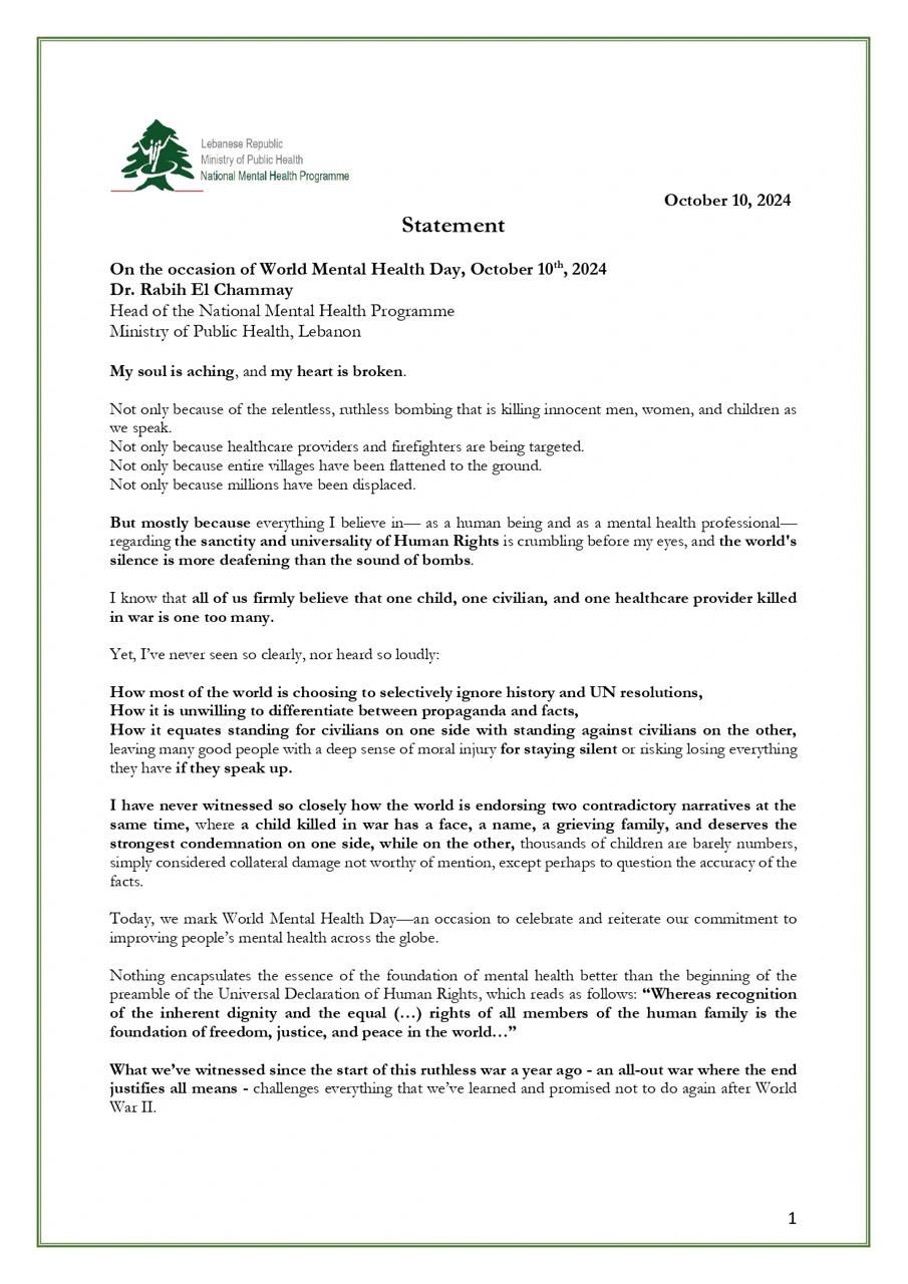
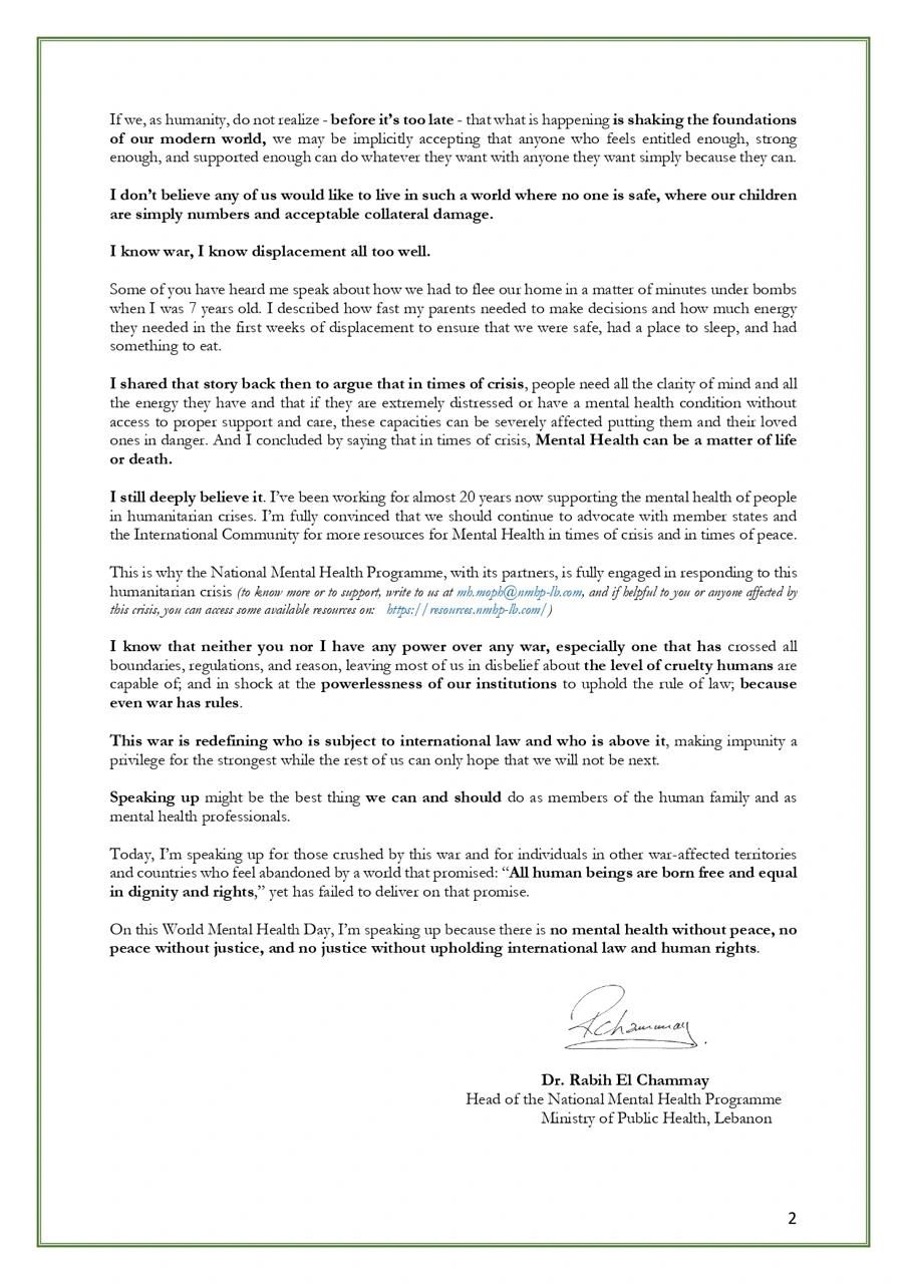
Middle East
AND YET – Mitchell Goldberg, Refugee Lawyer, Montreal Canada.
Some people say that the road to Israeli security is by destroying Hamas. It is true that Hamas is a brutal terrorist organization, the hostage crisis is despicable, and Hamas brutality afflicts Israelis as well as Palestinians.
And yet;
When Israeli governments decided to eradicate the PLO from Lebanon, they succeeded. Except for one thing. This lead directly to the creation of the far more powerful Iranian backed Hezbollah, which for many years has been attacking Israel from its northern border.
And yet;
Israeli governments decided that the solution to Hezbollah was to occupy southern Lebanon. This resulted in the IDF becoming sitting ducks without any improvement to Israeli security. The Israeli army was therefore compelled to leave Lebanon.
And yet;
The American government decided to invade Iraq and eradicate Sadam Hussein.
They succeeded in killing him and his loyalists. Only to leave behind a country dominated by Iranian backed militias.
And yet;
Psychological studies indicate that when young people are subjected to the brutal loss of life of loved ones, and utter deprivation, the trauma they experience can lead to the loss of compassion.
In other words the calamity we see unfolding every day in Gaza will likely impact generations of Palestinians. The same may be true in the occupied West Bank
Hatred is brewing, but we hope and pray that decency can find a way forward.
APA Statement Calling for an Immediate, Permanent, and Comprehensive Ceasefire in the Israel-Gaza Conflict. Approved by APA Council of Representatives, August 2024.
The American Psychological Association calls for an immediate, permanent, and comprehensive ceasefire in the Israel-Gaza conflict. In response to the violence, loss of life, and trauma caused by the ongoing conflict, APA expresses its deep concern for all Israelis, Palestinians, and other people impacted. APA urges cessation of violence and supports aid to the most vulnerable in the region be a top priority.
Indigenous internationalism against imprisoned indigeneity in Australia and Palestine. Kim Alley a and Lorenzo Veracini, Middle East Critique 2024, VOL. 33, NO. 2, 227–244. Open Access.
Indigenous Australians and Palestinians experience some of the highest rates of incarceration and state violence in the world. In this article’s first section we focus comparatively on administrative detention and other forms of incarceration to underline a commonality of oppression that is both historical and contemporary. We examine settler colonial structures of domination and the impact of structural violence on Indigenous bodies, seeking to understand how incarceration acts as a form of elimination, and how it contributes to the consolidation of settler colonial nation-hood. To counter incarceration and elimination, this article’s second and third sections call for a politics of solidarity premised on shared indigeneity.
Experts hail ICJ declaration on illegality of Israel’s presence in the occupied Palestinian territory as “historic” for Palestinians and international law. UN OHCHR, 30 July 2024.
GENEVA – Israel and other UN Member States must immediately comply with the authoritative determination by the International Court of Justice (ICJ) on Israel’s presence in the occupied Palestinian territory, independent human rights experts* said today.
Palestinian Rights Committee Bureau Welcomes Historic General Assembly Resolution Calling for End to Israel’s Occupation of Palestine. United Nations, 18 September 2024.
The resolution is a call to action, in accordance with international law and the permanent responsibility of the United Nations vis-à-vis the question of Palestine until it is justly resolved in all its aspects, aimed at bringing an end to this illegal situation and ensuring justice and the realization of the inalienable rights of the Palestinian people. It unequivocally reaffirms that “Israel’s continued presence in the Occupied Palestinian Territory is unlawful” and calls for “the end of Israel’s occupation within 12 months from the adoption of this resolution”.
Standing Together is a social movement, with over 50% of our funding coming from small one time and recurring donations.
Standing Together is a progressive grassroots movement mobilizing Jewish and Palestinian citizens of Israel against the occupation and for peace, equality, and social justice. We know that the majority have far more in common than that which sets us apart and only a tiny minority benefits from the status quo. The future that we want — peace and independence for Israelis and Palestinians, full equality for everyone in this land, and true social, economic, and environmental justice — is possible. To achieve this future, we must stand together as a united front: Jewish and Palestinian, secular and religious, Mizrahi and Ashkenazi, rural and urban, and people of all genders and sexual orientations. As the largest Jewish-Arab grassroots movement in Israel, we are committed to creating an alternative to our existing reality and building the political strength to make this transformation possible.
NAS Daily – Peace
Our mission is to bring people together, and that’s why we create content that does exactly that!
The 2024 ICJ Advisory Opinion on the Occupied Palestinian Territory. Verfassungsblog Debate
The Advisory Opinion of the International Court of Justice (ICJ) on the “Legal Consequences arising from the Policies and Practices of Israel in the Occupied Palestinian Territory, including East Jerusalem” was a groundbreaking moment in international law. It has consequences not only for Israel, but also for third States, as well as international and regional organizations, in terms of non-recognition and non-cooperation. In this blog symposium, Palestinian, Israeli, and other scholars take stock of the Advisory Opinion and its regional and global impact.
Section IX Board of Directors Statement in Support of Palestine. December 2, 2023
This is a statement of the Board of Directors of Psychoanalysis for Social Responsibility (Section IX), a section of the Society for Psychoanalysis and Psychoanalytic Psychology, Division 39 of the American Psychological Association. It does not represent the position of the American Psychological Association or any of its other Divisions or subunits.
Women
Paris-based Begum TV: A ‘window to the world’ for women in Afghanistan.Begum TV, launched March 8, 2024. 25 March 2024 – FRANCE24
Officially launched on March 8, 2024, the channel based in Paris, is accessible by satellite in Afghanistan. Begum TV offers educational and mental health programming targeted at women living there. The channel’s main mission is to provide access to education, as teenage girls and women are barred from secondary schools and universities in Afghanistan.
Two years after the death of Mahsa Amini, a ‘quiet revolution’ is still under way in Iran. Bahar Makooi, FRANCE24, September 16 2024.
The scale of the protest movement that erupted after the 2022 death of Mahsa Amini and the brutal repression of those demonstrations have left an indelible mark on Iranian society. More and more women are flouting the veil requirement when out in public in what one NGO has described as a “quiet revolution” while men’s behaviour and awareness have also seen a shift in the years since.
September 16 marks two years since a 22-year-old Kurdish-Iranian woman died after being detained by Iran’s morality police for wearing what they called an “ill-fitting” veil, sparking one of the largest waves of protests in the history of the Islamic Republic.
Migrant women face ‘second trauma’ when reporting sexual abuse in France. Anaelle Jonah, France24, 19 September 2024.
A recent report from Amnesty International reveals that undocumented women in France face significant barriers when reporting sexual violence, often encountering hostility from the institutions meant to help them. French NGOs say law enforcement has increasingly threatened migrants with deportation, even going so far as putting them in detention centres when they try to press charges.
The report, based on data from more than 20 civil organisations, sheds light on the “secondary victimisation” of these women, the institutional violence they suffer at the hands of police and judicial systems. According to the National Observatory on Violence Against Women, a woman is raped every two minutes in France. Only 6% of rape or attempted rape victims filed reports in 2021, and a mere 0.6% of these cases led to convictions in 2020.
Ambivalent Sexism and Tolerance of Violence Against Women in India. Nikhil K. Sengupta et al. Psychological Science, APS, 35-7, June 2024.
We examined associations between sexist beliefs and tolerance of violence against women in India using a nationally representative probability sample of adults (n = 133,398). Research consistently indicates that hostile sexism fosters tolerance of violence against women. However, benevolent sexism is sometimes associated with higher tolerance and sometimes with lower tolerance of violence. We proposed that this inconsistency could be resolved by considering the source of violence: Is violence perpetrated by outsiders or intimate partners? Results of a multigroup structural equation model showed that endorsement of hostile sexism was related to greater tolerance of violence regardless of the source. In contrast, endorsement of benevolent sexism was associated with lower tolerance of violence from outsiders but was simultaneously associated with higher tolerance of spousal violence. These opposing processes indicate that although benevolent sexism promises women protection from violence, the very same ideology legitimizes spousal violence, thereby reinforcing men’s power within intimate relationships.
Afghan women erased by the Taliban as the international community looks on. Pauline ROUQUETTE,FRANCE 24, 31 August 2024.
The oppression of Afghan women continues unabated before the eyes of the world. The Taliban imposed severe new restrictions earlier this month, with women not only obliged to cover their faces but now forbidden from raising their voices, singing or reading aloud in public. Western countries – led by the US and EU – have condemned the new laws but also seem resigned to the Taliban regime, which offers some stability in the region.
Invisible, and now silent. Three years after the Taliban’s return to power, Afghan women continue to see their few remaining rights dwindle away. A Taliban ministry promulgated a new set of laws on August 21 that it said “will be of great help in the promotion of virtue and the prevention of vice”. The laws aim to control all aspects of the social and private life of Afghans, especially of Afghan women. Among the rules in the 114-page text published by the ministry is the requirement for women to cover their bodies and faces completely if they leave the house as well as a ban on women making their voices heard in public.
The new laws are “attacking their very existence”, Chekeba Hachemi, president of the organisation Free Afghanistan, told FRANCE 24. “We no longer have the right to hear the sound of a woman’s voice, or to see even a glimpse of a woman’s body. It’s as if we were telling them: ‘We want to kill you slowly’.” “The only right we are allowed is to breathe. And even then …” Hamida Aman, the founder of Begum TV, a Paris-based channel aimed at educating Afghan women and girls, told France Culture.
PUBLICATIONS
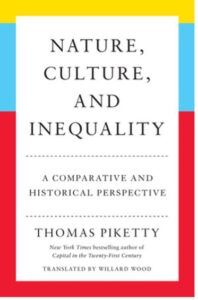 Is Inequality the Key to the Climate Change Debate? Manuela Andreoni, NY Times, September 12, 2024.
Is Inequality the Key to the Climate Change Debate? Manuela Andreoni, NY Times, September 12, 2024.
In his new book, the economist Thomas Piketty argues that the world can’t stop climate change without addressing issues of inequality. There is another economic lens through which we can look at climate change: Inequality, an issue that has been a concern for many voters in the past. At least that’s what the French economist Thomas Piketty argues in his new book, “Nature, Culture and Inequality: A Comparative Historical Perspective”.
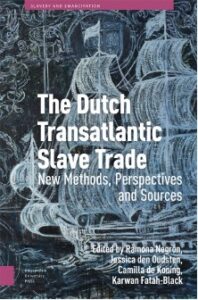 The Dutch Transatlantic slave trade. Ramona Negrón, Jessica den Oudsten, Camilla de Koning, Karwan Fatah-Black. Amsterdam University Press, November 2024.
The Dutch Transatlantic slave trade. Ramona Negrón, Jessica den Oudsten, Camilla de Koning, Karwan Fatah-Black. Amsterdam University Press, November 2024.
In recent years, the archives of the Middelburgse Commercie Compagnie (MCC), the Dutch West India Company (WIC) and the notarial archives of Amsterdam (SAA) were included in large-scale digitization projects. As a result, stories that were hidden for hundreds of years about the ins and outs of the trans-Atlantic slave trade are coming to light, waiting to be told. This new data, combined with digital tools, has allowed a new generation of historians to conduct in-depth research and analysis on previously understudies aspects of the Dutch Transatlantic slave trade.
 Girl, Woman, Other, Bernardine Evaristo, Jakob Gašperin Wischhoff, Verfassungsblog.
Girl, Woman, Other, Bernardine Evaristo, Jakob Gašperin Wischhoff, Verfassungsblog.
“Girl, Woman, Other” interlaces fables of Black womanhood, identity, race, and migration. Beautiful and nuanced, as well as masterfully written, Bernadine Evaristo‘s narratives lingered with me long after I finished the last page.
“if anyone asks her if she’s related to Osama bin Laden
if anyone tells her she’s responsible for them being unemployed
if anyone tells her she’s a cockroach immigrant
if anyone tells her to go back to her jihadist boyfriend
if anyone asks her if she knows any suicide bombers
if anyone tells her she doesn’t belong here and when are you leaving?
if anyone asks if she’s going to have an arranged marriage
if anyone asks her why she dresses like a nun
if anyone speaks slowly to her like she can’t speak English
if anyone tells her that her English is really good”
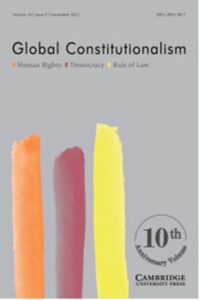 Academic freedom: Global variations in norm conceptualization, diffusion and contestation – an introduction. Kriszta Kovács & Janika Spannagel, Cambridge University Press, 3 October 2024.
Academic freedom: Global variations in norm conceptualization, diffusion and contestation – an introduction. Kriszta Kovács & Janika Spannagel, Cambridge University Press, 3 October 2024.
This Introduction provides an overview of the topics covered in this special issue on ‘Academic freedom: Global variations in norm conceptualization, diffusion and contestation’, which explores what academic freedom means, how this may vary on a global level, how the norm spread around the world and what current contestations look like. The Introduction defines some terms essential to this debate, such as the freedom of science, academic freedom, freedom of scientific research and the right to science, and offers an analytical framework for the various contributions of the special issue. This includes, in particular, a distinction between illiberal and liberal science scripts and their relationship with academic freedom, as well as between different forms of contestations and limitations of academic freedom. Authors from varying disciplinary and regional backgrounds address different aspects of this theme in their respective contributions, of which the introduction gives a brief summary.
OPPORTUNITIES
UPCOMING EVENTS
INHS Biennial Conference: Exploring the Dynamics of Hate – 25 – 27 November 2024- Cape Town, South Africa
The International Network for Hate Studies (INHS) is pleased to issue a call for papers for the fifth conference, “Dynamics of Hate: Examining Interdisciplinary Perspectives”. The University of South Africa (Unisa) and the Psychological Society of South Africa (PsySSA) will co-host the first INHS conference in the Southern Hemisphere. From hate speech to hate crimes, this conference delves into interdisciplinary perspectives to understand and combat hatred in all its forms.
The International Council of Psychologists 83rd Annual Conference
JOIN the International Council of Psychologists in Rotterdam, Netherlands for its 2025 Annual International Conference!
This vibrant conference will celebrate ICP’s mission to support Human rights, Dignity, and Justice: Social Inclusion and Migration
Location: Rotterdam, Erasmus University College
Registration and Information: https://icpweb.org/icp-annual-conference/icp2025/
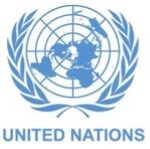 You can follow the meeting s of the Human Rights Council by the United Nations Web TV: https://media.un.org/en/asset/k15/k15fbsertp?kalturaStartTime=10784
You can follow the meeting s of the Human Rights Council by the United Nations Web TV: https://media.un.org/en/asset/k15/k15fbsertp?kalturaStartTime=10784
CONTACTS: Published by the Global Network of Psychologists for Human Rights – www.humanrightspsychology.org
Disclaimer: The website of the Global Network of Psychologists for Human Rights (GNPHR) contains articles, events and news about the domain where psychology and human rights intersect. The information presented in this Bulletin, does not imply that the GNPHR shares the views and beliefs in the articles.
- @GNPHR1
- How to get involved – read how you can contribute to the global network
- Consider contributing a Blog/Commentary
- News and Bulletins from the GNPHR – Subscribe to GNPHR
- Email addresses:
Ways to Participate in Global Network Activities
- Share Your Experiences and Examples
One of the best ways to illustrate the intersection of psychology and human rights is through example. We are looking for examples of your encounters with human rights issues in your professional life. You might describe a time when you protected (or failed to protect) human rights, or advocated for what you saw as a human rights issue. The events might be in your clinical, research, academic, applied, or volunteer work. Please send your narrative / story (500-1000 words) to Marlena Plavšić (marlena_plavsic@hotmail.com). We will compile these for publication in the GNPHR Bulletin and on the website. Please also indicate if you would like your stories to remain anonymous. - Share your Expertise and Opinions
We invite you to contribute a blog or opinion piece on general human rights issues; human rights education or strategies for raising the profile of human rights within psychology or your professional life. Students are welcome to contribute, including on student needs for learning about and addressing human rights. Please contact the GNPHR Blog editor (blogeditor@humanrightspsychology.org) with ideas for the article you would like to write! - Send articles/news/events
If you come across a human rights article or news, or know of an upcoming hunman rights event, please send for publication in the Bulletin. Send to the Bulletin editor Polli Hagenaars (polli.hagenaars@gmail.com).

